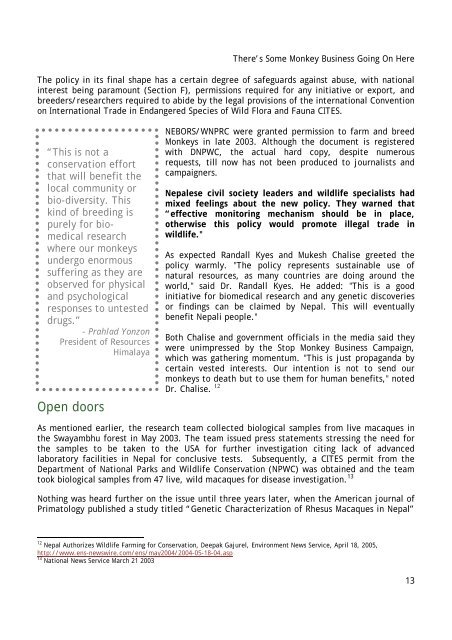Stop Monkey Business Campaign Report - Get a Free Blog
Stop Monkey Business Campaign Report - Get a Free Blog
Stop Monkey Business Campaign Report - Get a Free Blog
You also want an ePaper? Increase the reach of your titles
YUMPU automatically turns print PDFs into web optimized ePapers that Google loves.
There’s Some <strong>Monkey</strong> <strong>Business</strong> Going On Here<br />
The policy in its final shape has a certain degree of safeguards against abuse, with national<br />
interest being paramount (Section F), permissions required for any initiative or export, and<br />
breeders/researchers required to abide by the legal provisions of the international Convention<br />
on International Trade in Endangered Species of Wild Flora and Fauna CITES.<br />
“This is not a<br />
conservation effort<br />
that will benefit the<br />
local community or<br />
bio-diversity. This<br />
kind of breeding is<br />
purely for biomedical<br />
research<br />
where our monkeys<br />
undergo enormous<br />
suffering as they are<br />
observed for physical<br />
and psychological<br />
responses to untested<br />
drugs.”<br />
- Prahlad Yonzon<br />
President of Resources<br />
Himalaya<br />
Open doors<br />
NEBORS/WNPRC were granted permission to farm and breed<br />
<strong>Monkey</strong>s in late 2003. Although the document is registered<br />
with DNPWC, the actual hard copy, despite numerous<br />
requests, till now has not been produced to journalists and<br />
campaigners.<br />
Nepalese civil society leaders and wildlife specialists had<br />
mixed feelings about the new policy. They warned that<br />
“effective monitoring mechanism should be in place,<br />
otherwise this policy would promote illegal trade in<br />
wildlife."<br />
As expected Randall Kyes and Mukesh Chalise greeted the<br />
policy warmly. "The policy represents sustainable use of<br />
natural resources, as many countries are doing around the<br />
world," said Dr. Randall Kyes. He added: "This is a good<br />
initiative for biomedical research and any genetic discoveries<br />
or findings can be claimed by Nepal. This will eventually<br />
benefit Nepali people."<br />
Both Chalise and government officials in the media said they<br />
were unimpressed by the <strong>Stop</strong> <strong>Monkey</strong> <strong>Business</strong> <strong>Campaign</strong>,<br />
which was gathering momentum. "This is just propaganda by<br />
certain vested interests. Our intention is not to send our<br />
monkeys to death but to use them for human benefits," noted<br />
Dr. Chalise. 12<br />
As mentioned earlier, the research team collected biological samples from live macaques in<br />
the Swayambhu forest in May 2003. The team issued press statements stressing the need for<br />
the samples to be taken to the USA for further investigation citing lack of advanced<br />
laboratory facilities in Nepal for conclusive tests. Subsequently, a CITES permit from the<br />
Department of National Parks and Wildlife Conservation (NPWC) was obtained and the team<br />
took biological samples from 47 live, wild macaques for disease investigation. 13<br />
Nothing was heard further on the issue until three years later, when the American journal of<br />
Primatology published a study titled “Genetic Characterization of Rhesus Macaques in Nepal”<br />
12 Nepal Authorizes Wildlife Farming for Conservation, Deepak Gajurel, Environment News Service, April 18, 2005,<br />
http://www.ens-newswire.com/ens/may2004/2004-05-18-04.asp<br />
13 National News Service March 21 2003<br />
13


